Law and Business Obligations: Contractual and Fair Trading Laws
VerifiedAdded on 2020/04/01
|13
|2612
|33
Homework Assignment
AI Summary
This assignment provides a detailed analysis of several key areas of business law. It begins by examining the elements of a valid contract, including offer, acceptance, consideration, and intention to create legal relations, with a specific focus on the application of these principles in the context of e-commerce and electronic communications. The assignment also explores the consequences of breach of contract and the remedies available, such as compensation and specific performance. Furthermore, it delves into consumer protection laws, including the Consumer Guarantee Act and the Fair Trading Act, examining issues such as misleading advertising and unfair trade practices. The assignment also considers the legal implications of contracts involving minors and the role of guarantors. Finally, it provides a clear definition of illegal contracts under New Zealand law and outlines the penalties for breaches of the Fair Trading Act.
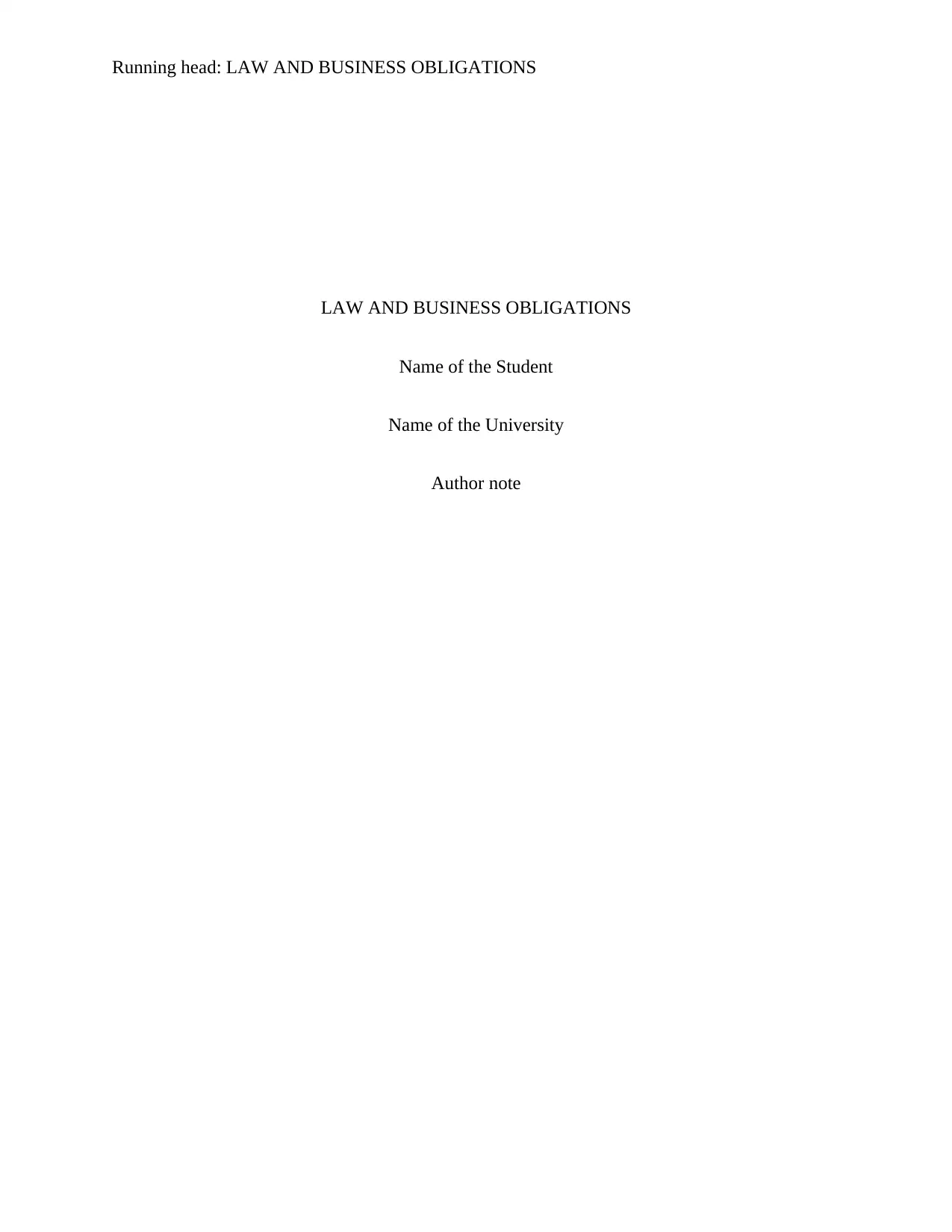
Running head: LAW AND BUSINESS OBLIGATIONS
LAW AND BUSINESS OBLIGATIONS
Name of the Student
Name of the University
Author note
LAW AND BUSINESS OBLIGATIONS
Name of the Student
Name of the University
Author note
Paraphrase This Document
Need a fresh take? Get an instant paraphrase of this document with our AI Paraphraser
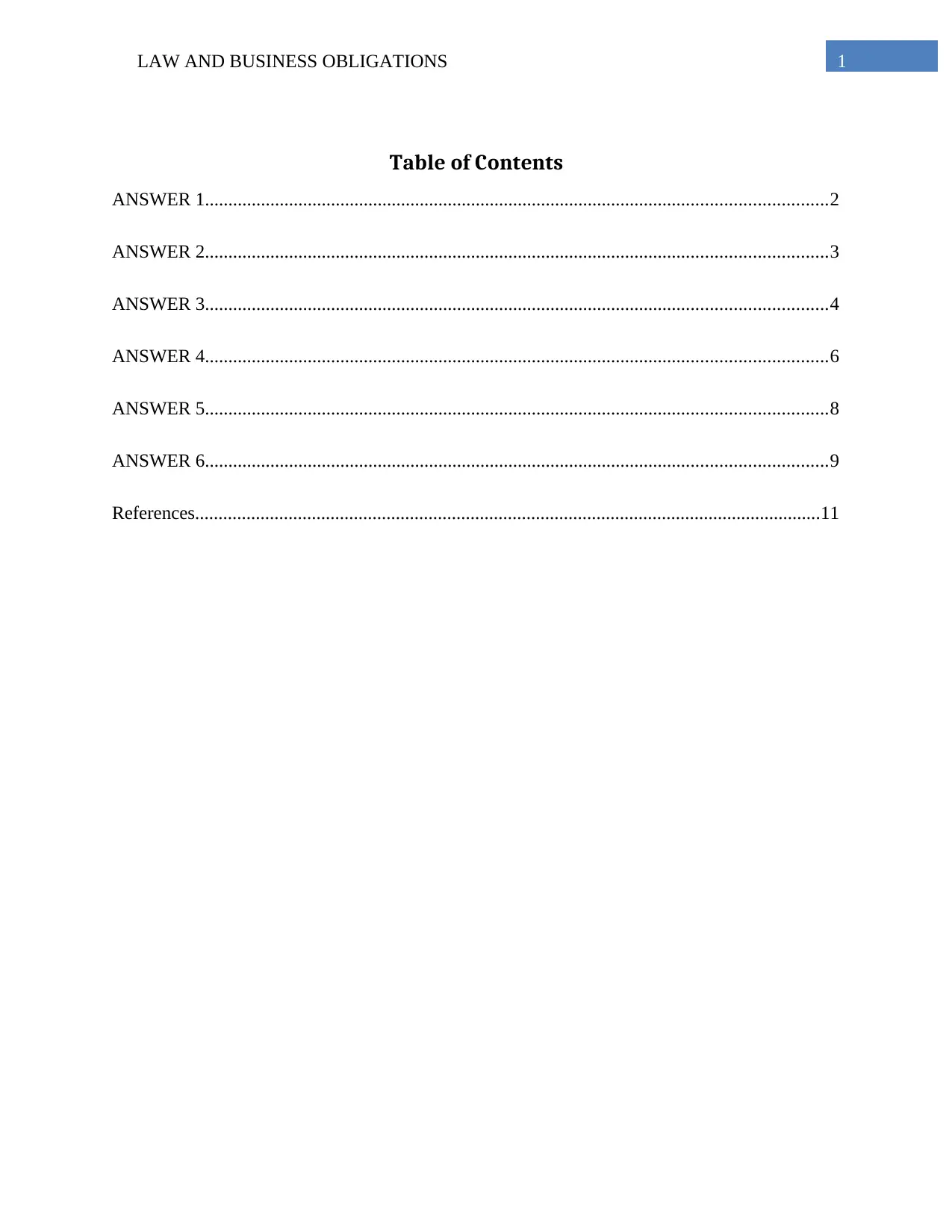
1LAW AND BUSINESS OBLIGATIONS
Table of Contents
ANSWER 1.....................................................................................................................................2
ANSWER 2.....................................................................................................................................3
ANSWER 3.....................................................................................................................................4
ANSWER 4.....................................................................................................................................6
ANSWER 5.....................................................................................................................................8
ANSWER 6.....................................................................................................................................9
References......................................................................................................................................11
Table of Contents
ANSWER 1.....................................................................................................................................2
ANSWER 2.....................................................................................................................................3
ANSWER 3.....................................................................................................................................4
ANSWER 4.....................................................................................................................................6
ANSWER 5.....................................................................................................................................8
ANSWER 6.....................................................................................................................................9
References......................................................................................................................................11
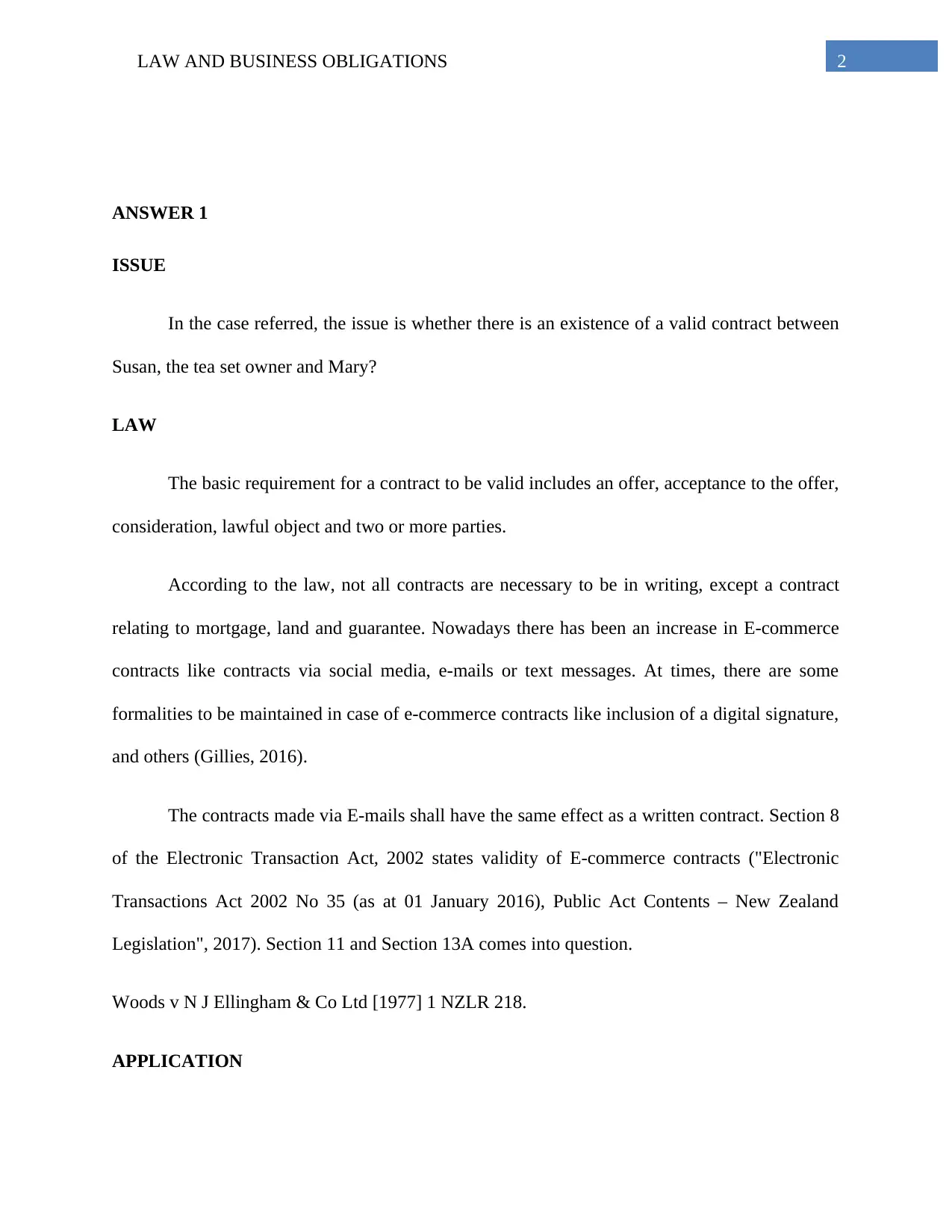
2LAW AND BUSINESS OBLIGATIONS
ANSWER 1
ISSUE
In the case referred, the issue is whether there is an existence of a valid contract between
Susan, the tea set owner and Mary?
LAW
The basic requirement for a contract to be valid includes an offer, acceptance to the offer,
consideration, lawful object and two or more parties.
According to the law, not all contracts are necessary to be in writing, except a contract
relating to mortgage, land and guarantee. Nowadays there has been an increase in E-commerce
contracts like contracts via social media, e-mails or text messages. At times, there are some
formalities to be maintained in case of e-commerce contracts like inclusion of a digital signature,
and others (Gillies, 2016).
The contracts made via E-mails shall have the same effect as a written contract. Section 8
of the Electronic Transaction Act, 2002 states validity of E-commerce contracts ("Electronic
Transactions Act 2002 No 35 (as at 01 January 2016), Public Act Contents – New Zealand
Legislation", 2017). Section 11 and Section 13A comes into question.
Woods v N J Ellingham & Co Ltd [1977] 1 NZLR 218.
APPLICATION
ANSWER 1
ISSUE
In the case referred, the issue is whether there is an existence of a valid contract between
Susan, the tea set owner and Mary?
LAW
The basic requirement for a contract to be valid includes an offer, acceptance to the offer,
consideration, lawful object and two or more parties.
According to the law, not all contracts are necessary to be in writing, except a contract
relating to mortgage, land and guarantee. Nowadays there has been an increase in E-commerce
contracts like contracts via social media, e-mails or text messages. At times, there are some
formalities to be maintained in case of e-commerce contracts like inclusion of a digital signature,
and others (Gillies, 2016).
The contracts made via E-mails shall have the same effect as a written contract. Section 8
of the Electronic Transaction Act, 2002 states validity of E-commerce contracts ("Electronic
Transactions Act 2002 No 35 (as at 01 January 2016), Public Act Contents – New Zealand
Legislation", 2017). Section 11 and Section 13A comes into question.
Woods v N J Ellingham & Co Ltd [1977] 1 NZLR 218.
APPLICATION
⊘ This is a preview!⊘
Do you want full access?
Subscribe today to unlock all pages.

Trusted by 1+ million students worldwide
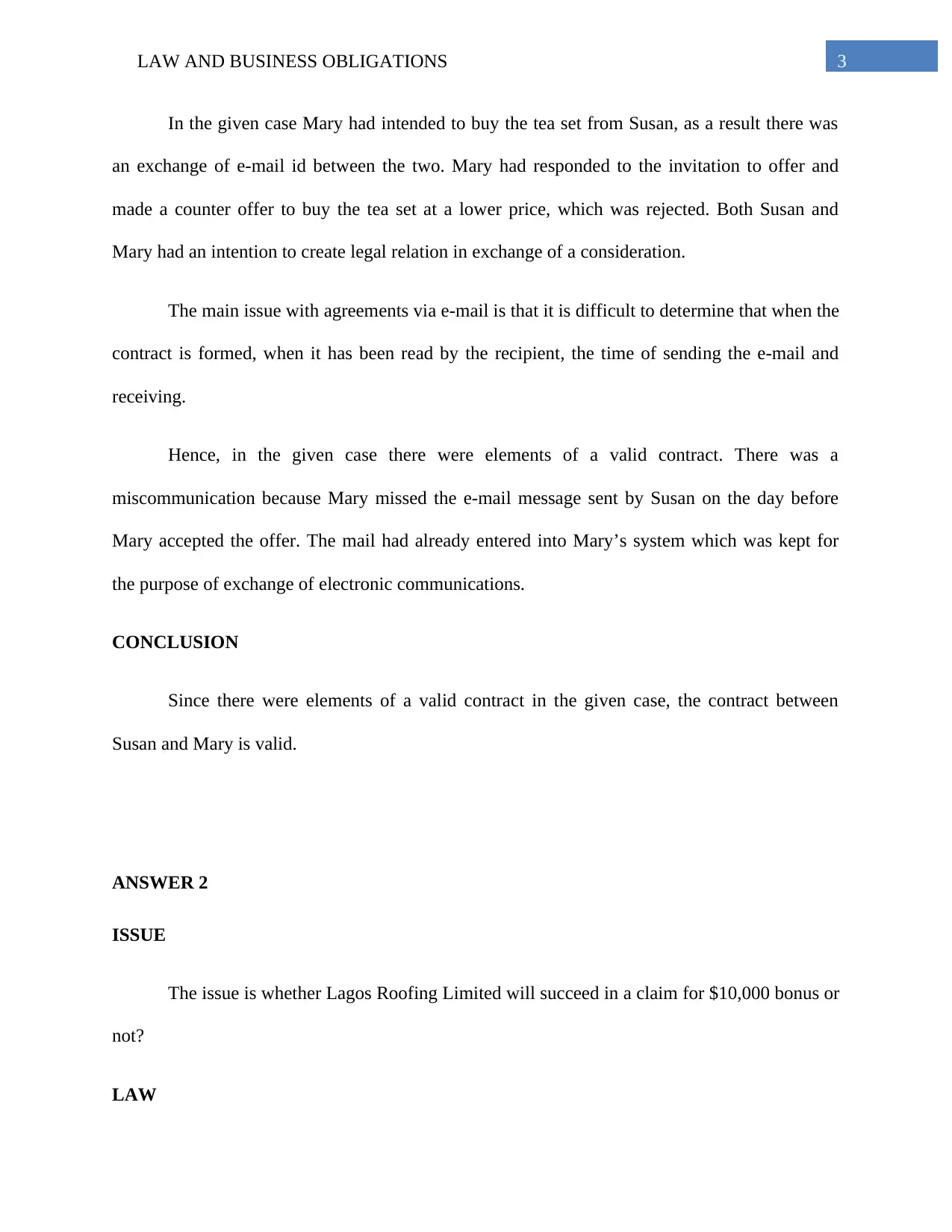
3LAW AND BUSINESS OBLIGATIONS
In the given case Mary had intended to buy the tea set from Susan, as a result there was
an exchange of e-mail id between the two. Mary had responded to the invitation to offer and
made a counter offer to buy the tea set at a lower price, which was rejected. Both Susan and
Mary had an intention to create legal relation in exchange of a consideration.
The main issue with agreements via e-mail is that it is difficult to determine that when the
contract is formed, when it has been read by the recipient, the time of sending the e-mail and
receiving.
Hence, in the given case there were elements of a valid contract. There was a
miscommunication because Mary missed the e-mail message sent by Susan on the day before
Mary accepted the offer. The mail had already entered into Mary’s system which was kept for
the purpose of exchange of electronic communications.
CONCLUSION
Since there were elements of a valid contract in the given case, the contract between
Susan and Mary is valid.
ANSWER 2
ISSUE
The issue is whether Lagos Roofing Limited will succeed in a claim for $10,000 bonus or
not?
LAW
In the given case Mary had intended to buy the tea set from Susan, as a result there was
an exchange of e-mail id between the two. Mary had responded to the invitation to offer and
made a counter offer to buy the tea set at a lower price, which was rejected. Both Susan and
Mary had an intention to create legal relation in exchange of a consideration.
The main issue with agreements via e-mail is that it is difficult to determine that when the
contract is formed, when it has been read by the recipient, the time of sending the e-mail and
receiving.
Hence, in the given case there were elements of a valid contract. There was a
miscommunication because Mary missed the e-mail message sent by Susan on the day before
Mary accepted the offer. The mail had already entered into Mary’s system which was kept for
the purpose of exchange of electronic communications.
CONCLUSION
Since there were elements of a valid contract in the given case, the contract between
Susan and Mary is valid.
ANSWER 2
ISSUE
The issue is whether Lagos Roofing Limited will succeed in a claim for $10,000 bonus or
not?
LAW
Paraphrase This Document
Need a fresh take? Get an instant paraphrase of this document with our AI Paraphraser
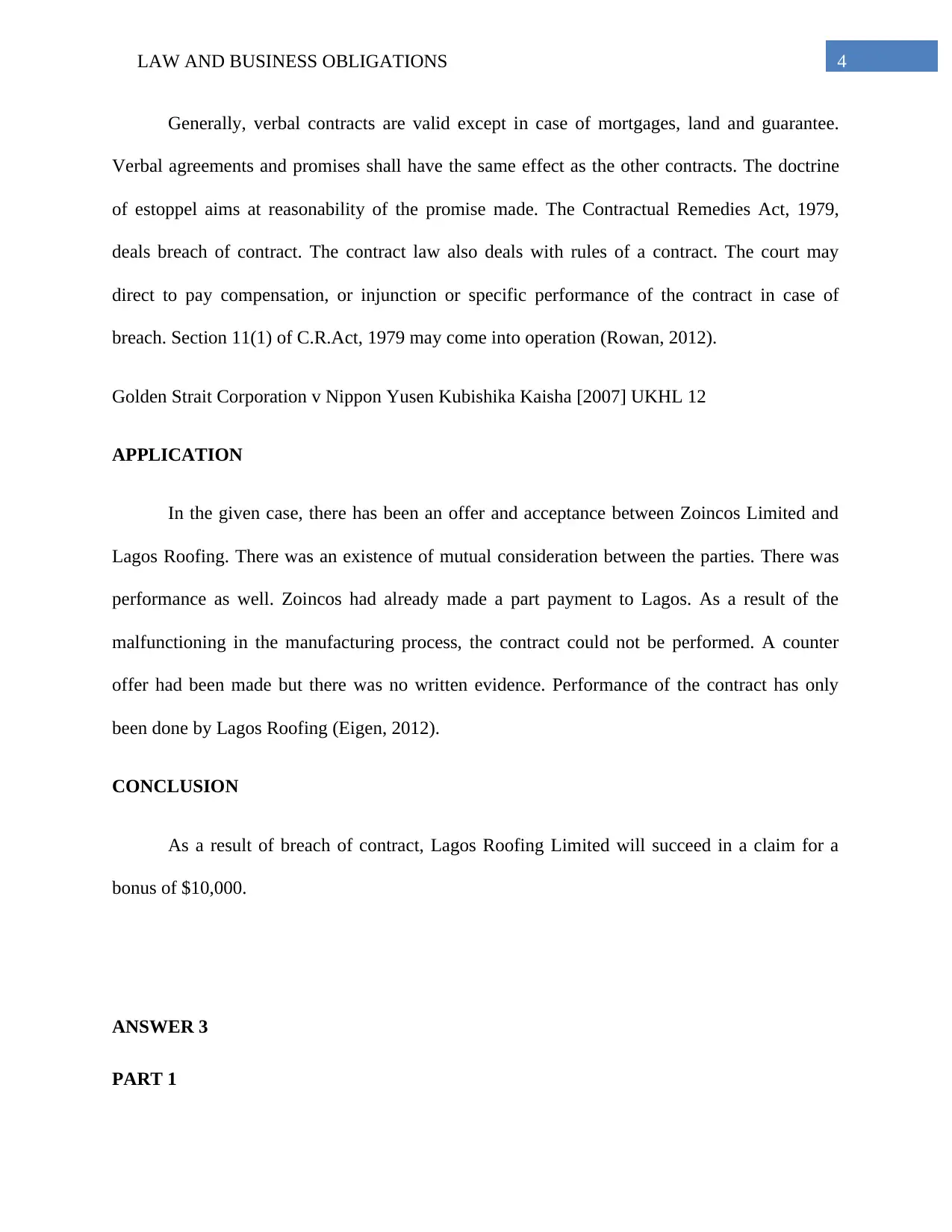
4LAW AND BUSINESS OBLIGATIONS
Generally, verbal contracts are valid except in case of mortgages, land and guarantee.
Verbal agreements and promises shall have the same effect as the other contracts. The doctrine
of estoppel aims at reasonability of the promise made. The Contractual Remedies Act, 1979,
deals breach of contract. The contract law also deals with rules of a contract. The court may
direct to pay compensation, or injunction or specific performance of the contract in case of
breach. Section 11(1) of C.R.Act, 1979 may come into operation (Rowan, 2012).
Golden Strait Corporation v Nippon Yusen Kubishika Kaisha [2007] UKHL 12
APPLICATION
In the given case, there has been an offer and acceptance between Zoincos Limited and
Lagos Roofing. There was an existence of mutual consideration between the parties. There was
performance as well. Zoincos had already made a part payment to Lagos. As a result of the
malfunctioning in the manufacturing process, the contract could not be performed. A counter
offer had been made but there was no written evidence. Performance of the contract has only
been done by Lagos Roofing (Eigen, 2012).
CONCLUSION
As a result of breach of contract, Lagos Roofing Limited will succeed in a claim for a
bonus of $10,000.
ANSWER 3
PART 1
Generally, verbal contracts are valid except in case of mortgages, land and guarantee.
Verbal agreements and promises shall have the same effect as the other contracts. The doctrine
of estoppel aims at reasonability of the promise made. The Contractual Remedies Act, 1979,
deals breach of contract. The contract law also deals with rules of a contract. The court may
direct to pay compensation, or injunction or specific performance of the contract in case of
breach. Section 11(1) of C.R.Act, 1979 may come into operation (Rowan, 2012).
Golden Strait Corporation v Nippon Yusen Kubishika Kaisha [2007] UKHL 12
APPLICATION
In the given case, there has been an offer and acceptance between Zoincos Limited and
Lagos Roofing. There was an existence of mutual consideration between the parties. There was
performance as well. Zoincos had already made a part payment to Lagos. As a result of the
malfunctioning in the manufacturing process, the contract could not be performed. A counter
offer had been made but there was no written evidence. Performance of the contract has only
been done by Lagos Roofing (Eigen, 2012).
CONCLUSION
As a result of breach of contract, Lagos Roofing Limited will succeed in a claim for a
bonus of $10,000.
ANSWER 3
PART 1
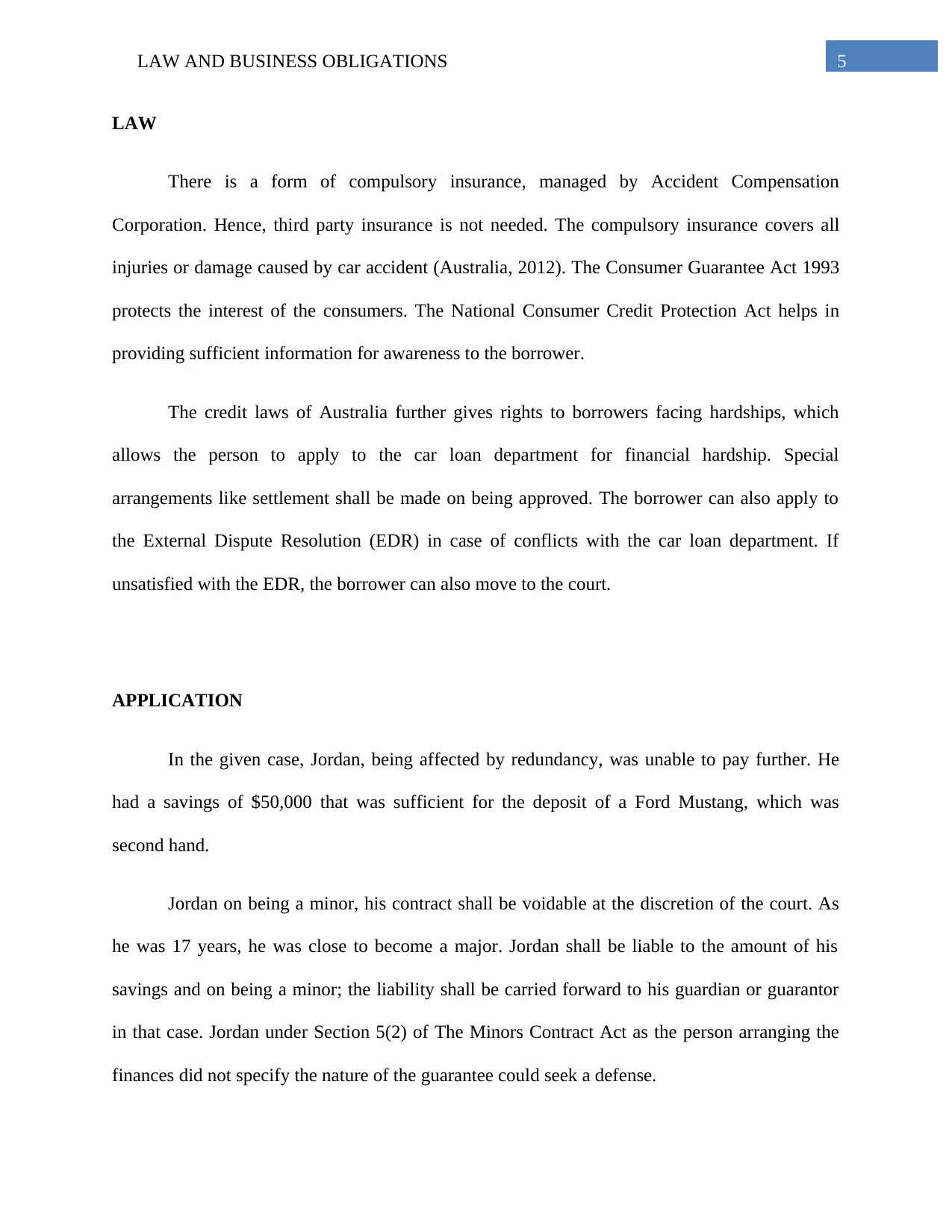
5LAW AND BUSINESS OBLIGATIONS
LAW
There is a form of compulsory insurance, managed by Accident Compensation
Corporation. Hence, third party insurance is not needed. The compulsory insurance covers all
injuries or damage caused by car accident (Australia, 2012). The Consumer Guarantee Act 1993
protects the interest of the consumers. The National Consumer Credit Protection Act helps in
providing sufficient information for awareness to the borrower.
The credit laws of Australia further gives rights to borrowers facing hardships, which
allows the person to apply to the car loan department for financial hardship. Special
arrangements like settlement shall be made on being approved. The borrower can also apply to
the External Dispute Resolution (EDR) in case of conflicts with the car loan department. If
unsatisfied with the EDR, the borrower can also move to the court.
APPLICATION
In the given case, Jordan, being affected by redundancy, was unable to pay further. He
had a savings of $50,000 that was sufficient for the deposit of a Ford Mustang, which was
second hand.
Jordan on being a minor, his contract shall be voidable at the discretion of the court. As
he was 17 years, he was close to become a major. Jordan shall be liable to the amount of his
savings and on being a minor; the liability shall be carried forward to his guardian or guarantor
in that case. Jordan under Section 5(2) of The Minors Contract Act as the person arranging the
finances did not specify the nature of the guarantee could seek a defense.
LAW
There is a form of compulsory insurance, managed by Accident Compensation
Corporation. Hence, third party insurance is not needed. The compulsory insurance covers all
injuries or damage caused by car accident (Australia, 2012). The Consumer Guarantee Act 1993
protects the interest of the consumers. The National Consumer Credit Protection Act helps in
providing sufficient information for awareness to the borrower.
The credit laws of Australia further gives rights to borrowers facing hardships, which
allows the person to apply to the car loan department for financial hardship. Special
arrangements like settlement shall be made on being approved. The borrower can also apply to
the External Dispute Resolution (EDR) in case of conflicts with the car loan department. If
unsatisfied with the EDR, the borrower can also move to the court.
APPLICATION
In the given case, Jordan, being affected by redundancy, was unable to pay further. He
had a savings of $50,000 that was sufficient for the deposit of a Ford Mustang, which was
second hand.
Jordan on being a minor, his contract shall be voidable at the discretion of the court. As
he was 17 years, he was close to become a major. Jordan shall be liable to the amount of his
savings and on being a minor; the liability shall be carried forward to his guardian or guarantor
in that case. Jordan under Section 5(2) of The Minors Contract Act as the person arranging the
finances did not specify the nature of the guarantee could seek a defense.
⊘ This is a preview!⊘
Do you want full access?
Subscribe today to unlock all pages.

Trusted by 1+ million students worldwide
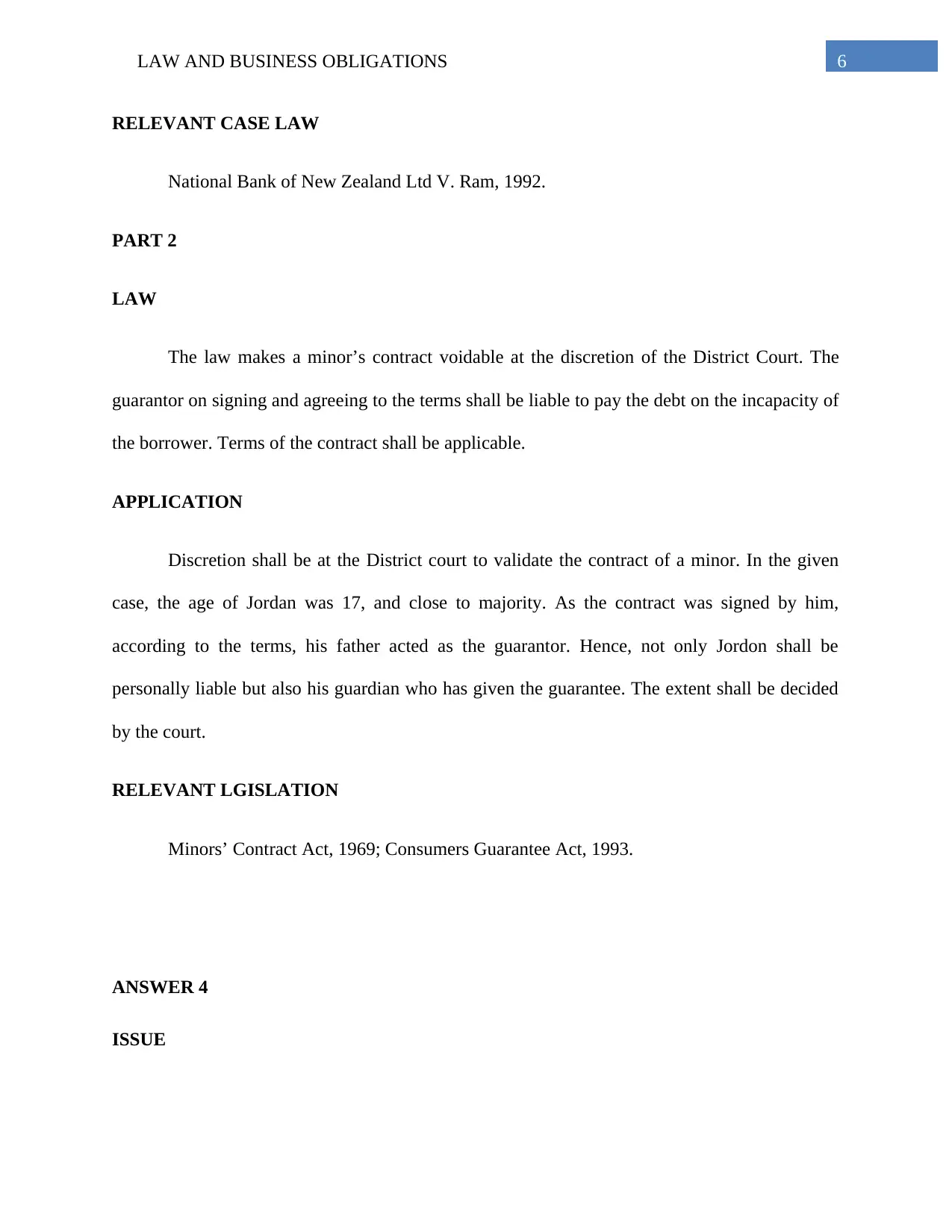
6LAW AND BUSINESS OBLIGATIONS
RELEVANT CASE LAW
National Bank of New Zealand Ltd V. Ram, 1992.
PART 2
LAW
The law makes a minor’s contract voidable at the discretion of the District Court. The
guarantor on signing and agreeing to the terms shall be liable to pay the debt on the incapacity of
the borrower. Terms of the contract shall be applicable.
APPLICATION
Discretion shall be at the District court to validate the contract of a minor. In the given
case, the age of Jordan was 17, and close to majority. As the contract was signed by him,
according to the terms, his father acted as the guarantor. Hence, not only Jordon shall be
personally liable but also his guardian who has given the guarantee. The extent shall be decided
by the court.
RELEVANT LGISLATION
Minors’ Contract Act, 1969; Consumers Guarantee Act, 1993.
ANSWER 4
ISSUE
RELEVANT CASE LAW
National Bank of New Zealand Ltd V. Ram, 1992.
PART 2
LAW
The law makes a minor’s contract voidable at the discretion of the District Court. The
guarantor on signing and agreeing to the terms shall be liable to pay the debt on the incapacity of
the borrower. Terms of the contract shall be applicable.
APPLICATION
Discretion shall be at the District court to validate the contract of a minor. In the given
case, the age of Jordan was 17, and close to majority. As the contract was signed by him,
according to the terms, his father acted as the guarantor. Hence, not only Jordon shall be
personally liable but also his guardian who has given the guarantee. The extent shall be decided
by the court.
RELEVANT LGISLATION
Minors’ Contract Act, 1969; Consumers Guarantee Act, 1993.
ANSWER 4
ISSUE
Paraphrase This Document
Need a fresh take? Get an instant paraphrase of this document with our AI Paraphraser
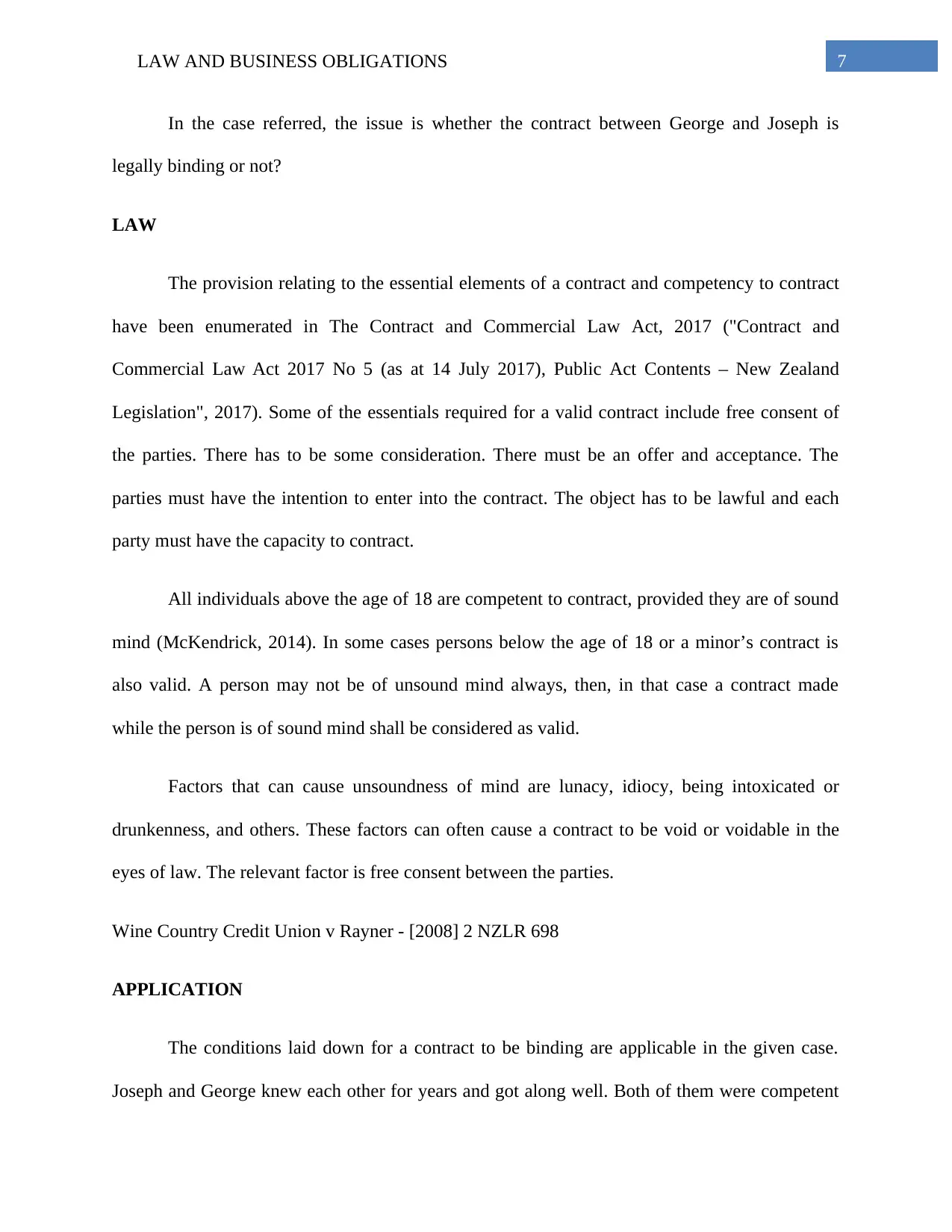
7LAW AND BUSINESS OBLIGATIONS
In the case referred, the issue is whether the contract between George and Joseph is
legally binding or not?
LAW
The provision relating to the essential elements of a contract and competency to contract
have been enumerated in The Contract and Commercial Law Act, 2017 ("Contract and
Commercial Law Act 2017 No 5 (as at 14 July 2017), Public Act Contents – New Zealand
Legislation", 2017). Some of the essentials required for a valid contract include free consent of
the parties. There has to be some consideration. There must be an offer and acceptance. The
parties must have the intention to enter into the contract. The object has to be lawful and each
party must have the capacity to contract.
All individuals above the age of 18 are competent to contract, provided they are of sound
mind (McKendrick, 2014). In some cases persons below the age of 18 or a minor’s contract is
also valid. A person may not be of unsound mind always, then, in that case a contract made
while the person is of sound mind shall be considered as valid.
Factors that can cause unsoundness of mind are lunacy, idiocy, being intoxicated or
drunkenness, and others. These factors can often cause a contract to be void or voidable in the
eyes of law. The relevant factor is free consent between the parties.
Wine Country Credit Union v Rayner - [2008] 2 NZLR 698
APPLICATION
The conditions laid down for a contract to be binding are applicable in the given case.
Joseph and George knew each other for years and got along well. Both of them were competent
In the case referred, the issue is whether the contract between George and Joseph is
legally binding or not?
LAW
The provision relating to the essential elements of a contract and competency to contract
have been enumerated in The Contract and Commercial Law Act, 2017 ("Contract and
Commercial Law Act 2017 No 5 (as at 14 July 2017), Public Act Contents – New Zealand
Legislation", 2017). Some of the essentials required for a valid contract include free consent of
the parties. There has to be some consideration. There must be an offer and acceptance. The
parties must have the intention to enter into the contract. The object has to be lawful and each
party must have the capacity to contract.
All individuals above the age of 18 are competent to contract, provided they are of sound
mind (McKendrick, 2014). In some cases persons below the age of 18 or a minor’s contract is
also valid. A person may not be of unsound mind always, then, in that case a contract made
while the person is of sound mind shall be considered as valid.
Factors that can cause unsoundness of mind are lunacy, idiocy, being intoxicated or
drunkenness, and others. These factors can often cause a contract to be void or voidable in the
eyes of law. The relevant factor is free consent between the parties.
Wine Country Credit Union v Rayner - [2008] 2 NZLR 698
APPLICATION
The conditions laid down for a contract to be binding are applicable in the given case.
Joseph and George knew each other for years and got along well. Both of them were competent
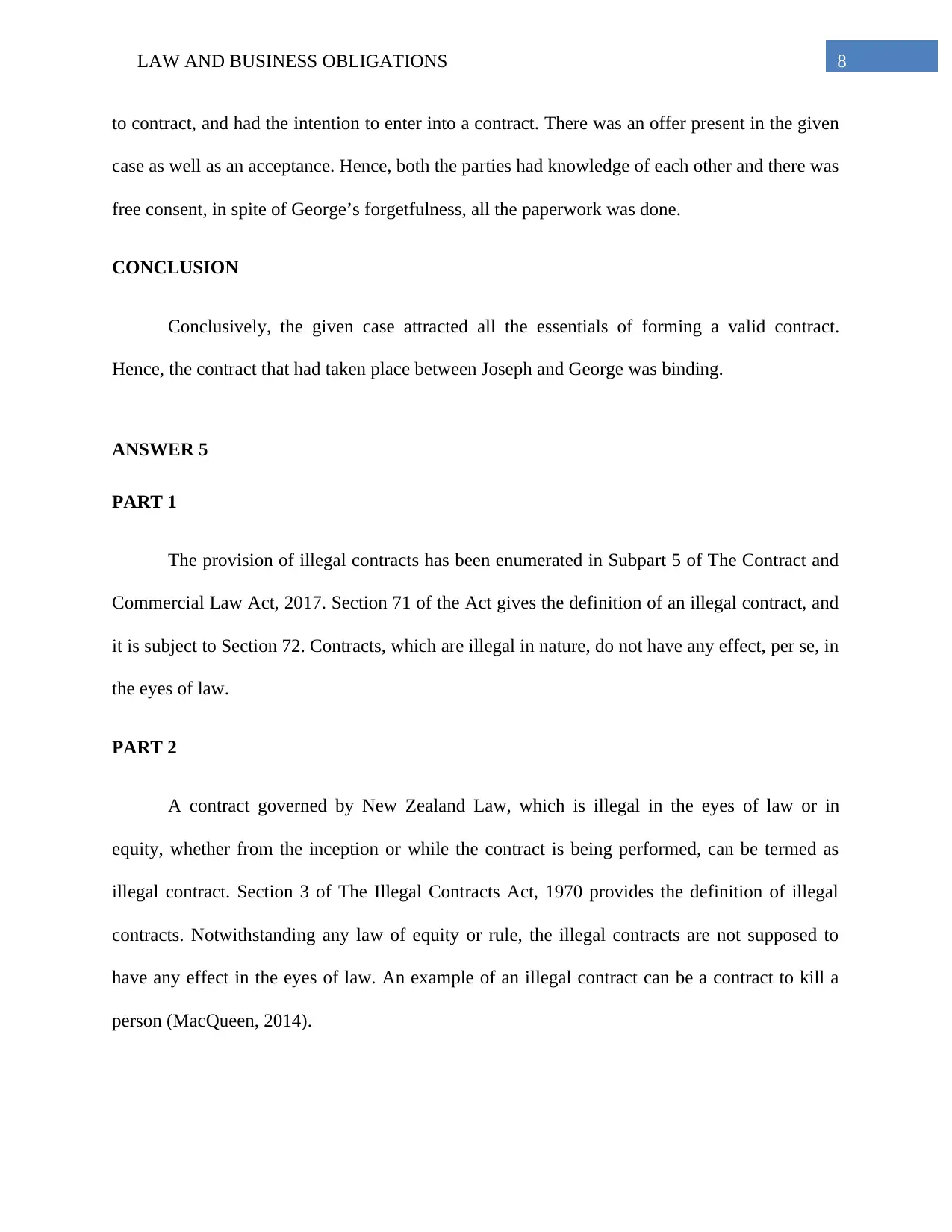
8LAW AND BUSINESS OBLIGATIONS
to contract, and had the intention to enter into a contract. There was an offer present in the given
case as well as an acceptance. Hence, both the parties had knowledge of each other and there was
free consent, in spite of George’s forgetfulness, all the paperwork was done.
CONCLUSION
Conclusively, the given case attracted all the essentials of forming a valid contract.
Hence, the contract that had taken place between Joseph and George was binding.
ANSWER 5
PART 1
The provision of illegal contracts has been enumerated in Subpart 5 of The Contract and
Commercial Law Act, 2017. Section 71 of the Act gives the definition of an illegal contract, and
it is subject to Section 72. Contracts, which are illegal in nature, do not have any effect, per se, in
the eyes of law.
PART 2
A contract governed by New Zealand Law, which is illegal in the eyes of law or in
equity, whether from the inception or while the contract is being performed, can be termed as
illegal contract. Section 3 of The Illegal Contracts Act, 1970 provides the definition of illegal
contracts. Notwithstanding any law of equity or rule, the illegal contracts are not supposed to
have any effect in the eyes of law. An example of an illegal contract can be a contract to kill a
person (MacQueen, 2014).
to contract, and had the intention to enter into a contract. There was an offer present in the given
case as well as an acceptance. Hence, both the parties had knowledge of each other and there was
free consent, in spite of George’s forgetfulness, all the paperwork was done.
CONCLUSION
Conclusively, the given case attracted all the essentials of forming a valid contract.
Hence, the contract that had taken place between Joseph and George was binding.
ANSWER 5
PART 1
The provision of illegal contracts has been enumerated in Subpart 5 of The Contract and
Commercial Law Act, 2017. Section 71 of the Act gives the definition of an illegal contract, and
it is subject to Section 72. Contracts, which are illegal in nature, do not have any effect, per se, in
the eyes of law.
PART 2
A contract governed by New Zealand Law, which is illegal in the eyes of law or in
equity, whether from the inception or while the contract is being performed, can be termed as
illegal contract. Section 3 of The Illegal Contracts Act, 1970 provides the definition of illegal
contracts. Notwithstanding any law of equity or rule, the illegal contracts are not supposed to
have any effect in the eyes of law. An example of an illegal contract can be a contract to kill a
person (MacQueen, 2014).
⊘ This is a preview!⊘
Do you want full access?
Subscribe today to unlock all pages.

Trusted by 1+ million students worldwide
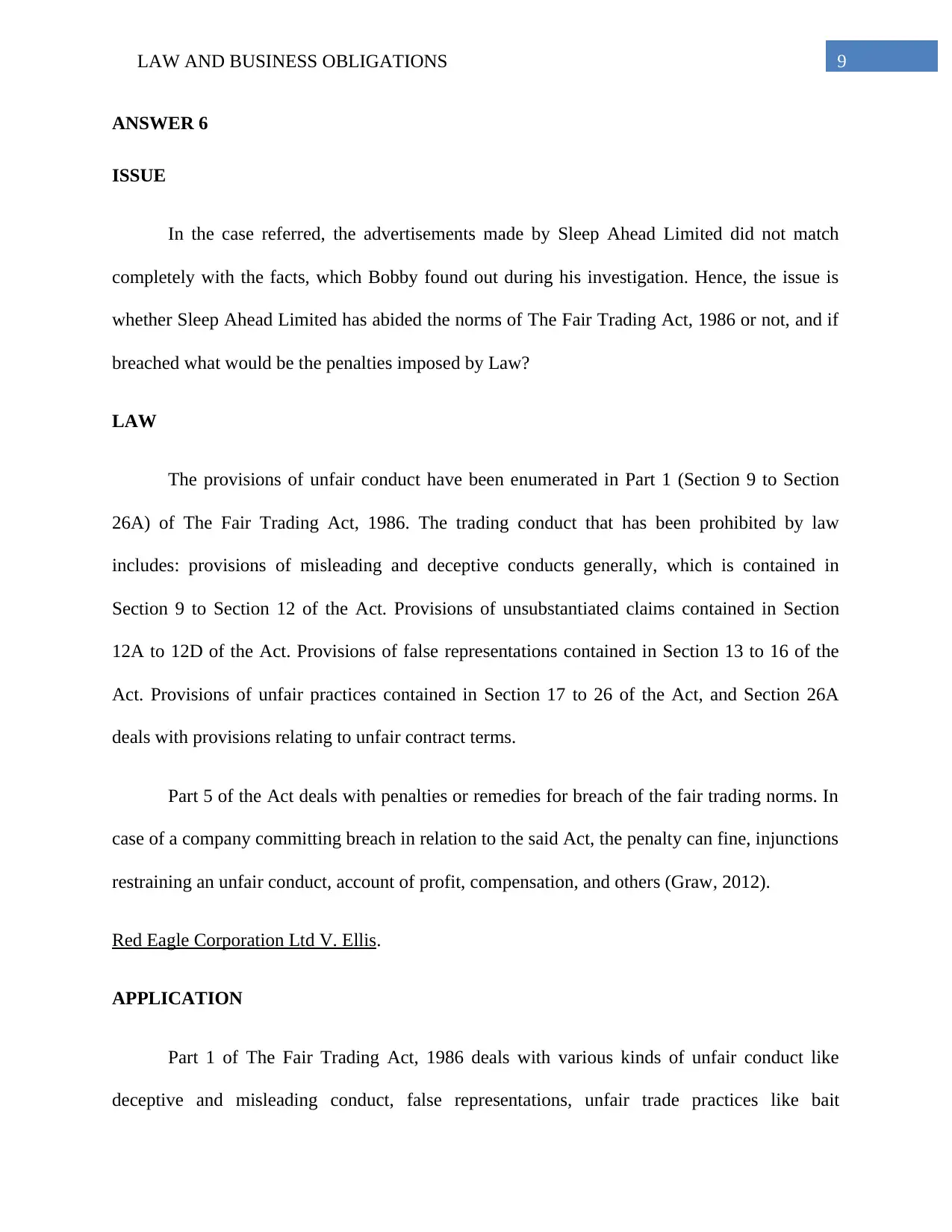
9LAW AND BUSINESS OBLIGATIONS
ANSWER 6
ISSUE
In the case referred, the advertisements made by Sleep Ahead Limited did not match
completely with the facts, which Bobby found out during his investigation. Hence, the issue is
whether Sleep Ahead Limited has abided the norms of The Fair Trading Act, 1986 or not, and if
breached what would be the penalties imposed by Law?
LAW
The provisions of unfair conduct have been enumerated in Part 1 (Section 9 to Section
26A) of The Fair Trading Act, 1986. The trading conduct that has been prohibited by law
includes: provisions of misleading and deceptive conducts generally, which is contained in
Section 9 to Section 12 of the Act. Provisions of unsubstantiated claims contained in Section
12A to 12D of the Act. Provisions of false representations contained in Section 13 to 16 of the
Act. Provisions of unfair practices contained in Section 17 to 26 of the Act, and Section 26A
deals with provisions relating to unfair contract terms.
Part 5 of the Act deals with penalties or remedies for breach of the fair trading norms. In
case of a company committing breach in relation to the said Act, the penalty can fine, injunctions
restraining an unfair conduct, account of profit, compensation, and others (Graw, 2012).
Red Eagle Corporation Ltd V. Ellis.
APPLICATION
Part 1 of The Fair Trading Act, 1986 deals with various kinds of unfair conduct like
deceptive and misleading conduct, false representations, unfair trade practices like bait
ANSWER 6
ISSUE
In the case referred, the advertisements made by Sleep Ahead Limited did not match
completely with the facts, which Bobby found out during his investigation. Hence, the issue is
whether Sleep Ahead Limited has abided the norms of The Fair Trading Act, 1986 or not, and if
breached what would be the penalties imposed by Law?
LAW
The provisions of unfair conduct have been enumerated in Part 1 (Section 9 to Section
26A) of The Fair Trading Act, 1986. The trading conduct that has been prohibited by law
includes: provisions of misleading and deceptive conducts generally, which is contained in
Section 9 to Section 12 of the Act. Provisions of unsubstantiated claims contained in Section
12A to 12D of the Act. Provisions of false representations contained in Section 13 to 16 of the
Act. Provisions of unfair practices contained in Section 17 to 26 of the Act, and Section 26A
deals with provisions relating to unfair contract terms.
Part 5 of the Act deals with penalties or remedies for breach of the fair trading norms. In
case of a company committing breach in relation to the said Act, the penalty can fine, injunctions
restraining an unfair conduct, account of profit, compensation, and others (Graw, 2012).
Red Eagle Corporation Ltd V. Ellis.
APPLICATION
Part 1 of The Fair Trading Act, 1986 deals with various kinds of unfair conduct like
deceptive and misleading conduct, false representations, unfair trade practices like bait
Paraphrase This Document
Need a fresh take? Get an instant paraphrase of this document with our AI Paraphraser
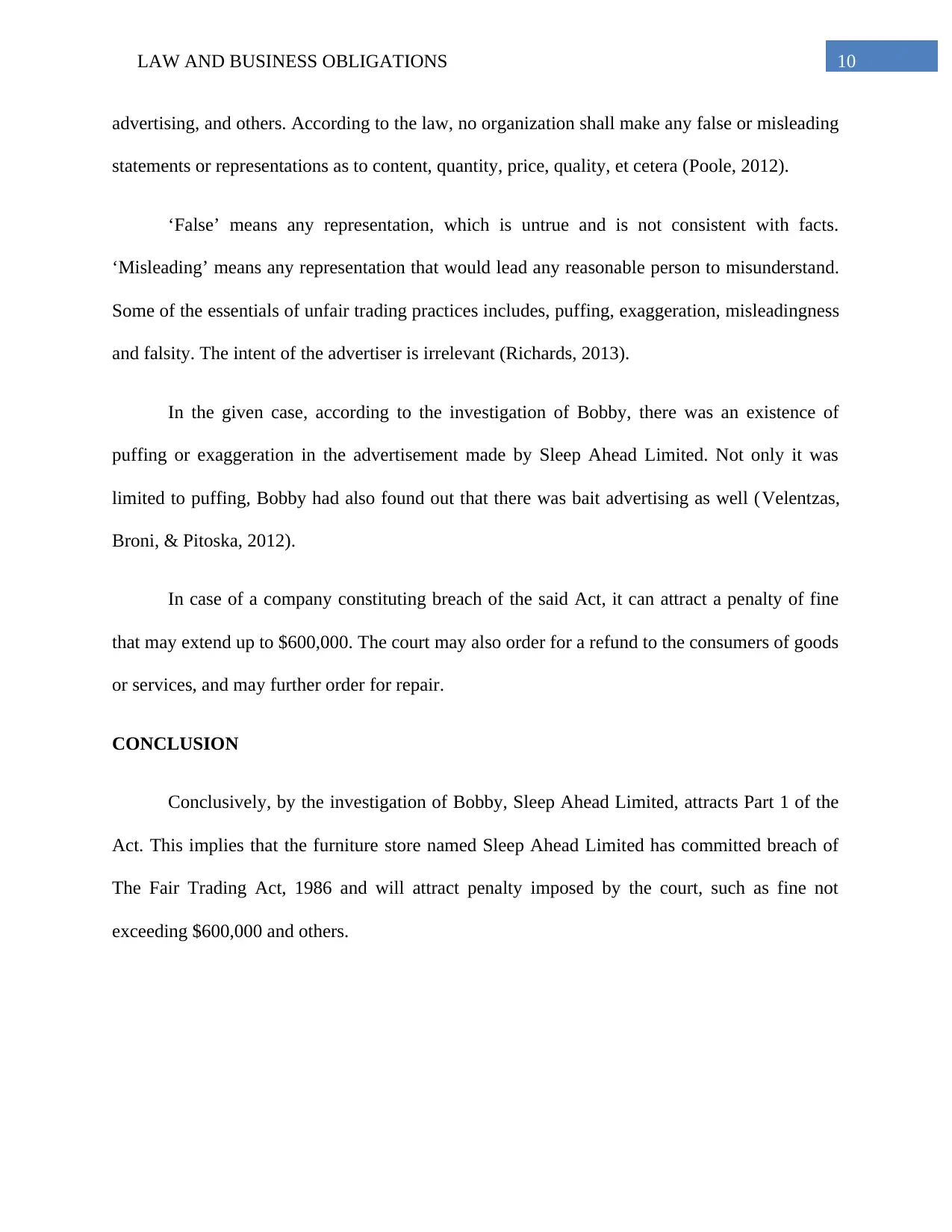
10LAW AND BUSINESS OBLIGATIONS
advertising, and others. According to the law, no organization shall make any false or misleading
statements or representations as to content, quantity, price, quality, et cetera (Poole, 2012).
‘False’ means any representation, which is untrue and is not consistent with facts.
‘Misleading’ means any representation that would lead any reasonable person to misunderstand.
Some of the essentials of unfair trading practices includes, puffing, exaggeration, misleadingness
and falsity. The intent of the advertiser is irrelevant (Richards, 2013).
In the given case, according to the investigation of Bobby, there was an existence of
puffing or exaggeration in the advertisement made by Sleep Ahead Limited. Not only it was
limited to puffing, Bobby had also found out that there was bait advertising as well (Velentzas,
Broni, & Pitoska, 2012).
In case of a company constituting breach of the said Act, it can attract a penalty of fine
that may extend up to $600,000. The court may also order for a refund to the consumers of goods
or services, and may further order for repair.
CONCLUSION
Conclusively, by the investigation of Bobby, Sleep Ahead Limited, attracts Part 1 of the
Act. This implies that the furniture store named Sleep Ahead Limited has committed breach of
The Fair Trading Act, 1986 and will attract penalty imposed by the court, such as fine not
exceeding $600,000 and others.
advertising, and others. According to the law, no organization shall make any false or misleading
statements or representations as to content, quantity, price, quality, et cetera (Poole, 2012).
‘False’ means any representation, which is untrue and is not consistent with facts.
‘Misleading’ means any representation that would lead any reasonable person to misunderstand.
Some of the essentials of unfair trading practices includes, puffing, exaggeration, misleadingness
and falsity. The intent of the advertiser is irrelevant (Richards, 2013).
In the given case, according to the investigation of Bobby, there was an existence of
puffing or exaggeration in the advertisement made by Sleep Ahead Limited. Not only it was
limited to puffing, Bobby had also found out that there was bait advertising as well (Velentzas,
Broni, & Pitoska, 2012).
In case of a company constituting breach of the said Act, it can attract a penalty of fine
that may extend up to $600,000. The court may also order for a refund to the consumers of goods
or services, and may further order for repair.
CONCLUSION
Conclusively, by the investigation of Bobby, Sleep Ahead Limited, attracts Part 1 of the
Act. This implies that the furniture store named Sleep Ahead Limited has committed breach of
The Fair Trading Act, 1986 and will attract penalty imposed by the court, such as fine not
exceeding $600,000 and others.
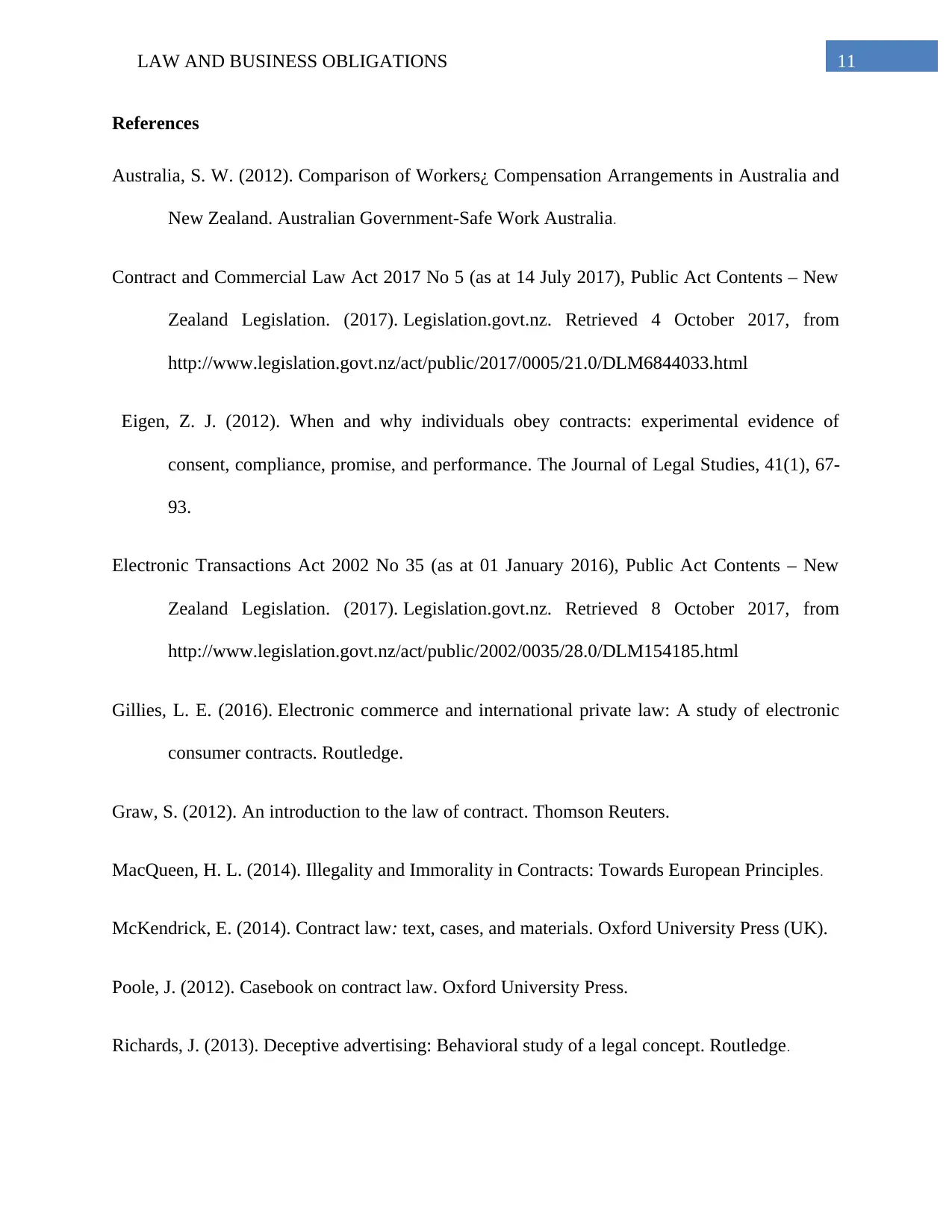
11LAW AND BUSINESS OBLIGATIONS
References
Australia, S. W. (2012). Comparison of Workers¿ Compensation Arrangements in Australia and
New Zealand. Australian Government-Safe Work Australia.
Contract and Commercial Law Act 2017 No 5 (as at 14 July 2017), Public Act Contents – New
Zealand Legislation. (2017). Legislation.govt.nz. Retrieved 4 October 2017, from
http://www.legislation.govt.nz/act/public/2017/0005/21.0/DLM6844033.html
Eigen, Z. J. (2012). When and why individuals obey contracts: experimental evidence of
consent, compliance, promise, and performance. The Journal of Legal Studies, 41(1), 67-
93.
Electronic Transactions Act 2002 No 35 (as at 01 January 2016), Public Act Contents – New
Zealand Legislation. (2017). Legislation.govt.nz. Retrieved 8 October 2017, from
http://www.legislation.govt.nz/act/public/2002/0035/28.0/DLM154185.html
Gillies, L. E. (2016). Electronic commerce and international private law: A study of electronic
consumer contracts. Routledge.
Graw, S. (2012). An introduction to the law of contract. Thomson Reuters.
MacQueen, H. L. (2014). Illegality and Immorality in Contracts: Towards European Principles.
McKendrick, E. (2014). Contract law: text, cases, and materials. Oxford University Press (UK).
Poole, J. (2012). Casebook on contract law. Oxford University Press.
Richards, J. (2013). Deceptive advertising: Behavioral study of a legal concept. Routledge.
References
Australia, S. W. (2012). Comparison of Workers¿ Compensation Arrangements in Australia and
New Zealand. Australian Government-Safe Work Australia.
Contract and Commercial Law Act 2017 No 5 (as at 14 July 2017), Public Act Contents – New
Zealand Legislation. (2017). Legislation.govt.nz. Retrieved 4 October 2017, from
http://www.legislation.govt.nz/act/public/2017/0005/21.0/DLM6844033.html
Eigen, Z. J. (2012). When and why individuals obey contracts: experimental evidence of
consent, compliance, promise, and performance. The Journal of Legal Studies, 41(1), 67-
93.
Electronic Transactions Act 2002 No 35 (as at 01 January 2016), Public Act Contents – New
Zealand Legislation. (2017). Legislation.govt.nz. Retrieved 8 October 2017, from
http://www.legislation.govt.nz/act/public/2002/0035/28.0/DLM154185.html
Gillies, L. E. (2016). Electronic commerce and international private law: A study of electronic
consumer contracts. Routledge.
Graw, S. (2012). An introduction to the law of contract. Thomson Reuters.
MacQueen, H. L. (2014). Illegality and Immorality in Contracts: Towards European Principles.
McKendrick, E. (2014). Contract law: text, cases, and materials. Oxford University Press (UK).
Poole, J. (2012). Casebook on contract law. Oxford University Press.
Richards, J. (2013). Deceptive advertising: Behavioral study of a legal concept. Routledge.
⊘ This is a preview!⊘
Do you want full access?
Subscribe today to unlock all pages.

Trusted by 1+ million students worldwide
1 out of 13
Related Documents
Your All-in-One AI-Powered Toolkit for Academic Success.
+13062052269
info@desklib.com
Available 24*7 on WhatsApp / Email
![[object Object]](/_next/static/media/star-bottom.7253800d.svg)
Unlock your academic potential
Copyright © 2020–2025 A2Z Services. All Rights Reserved. Developed and managed by ZUCOL.





